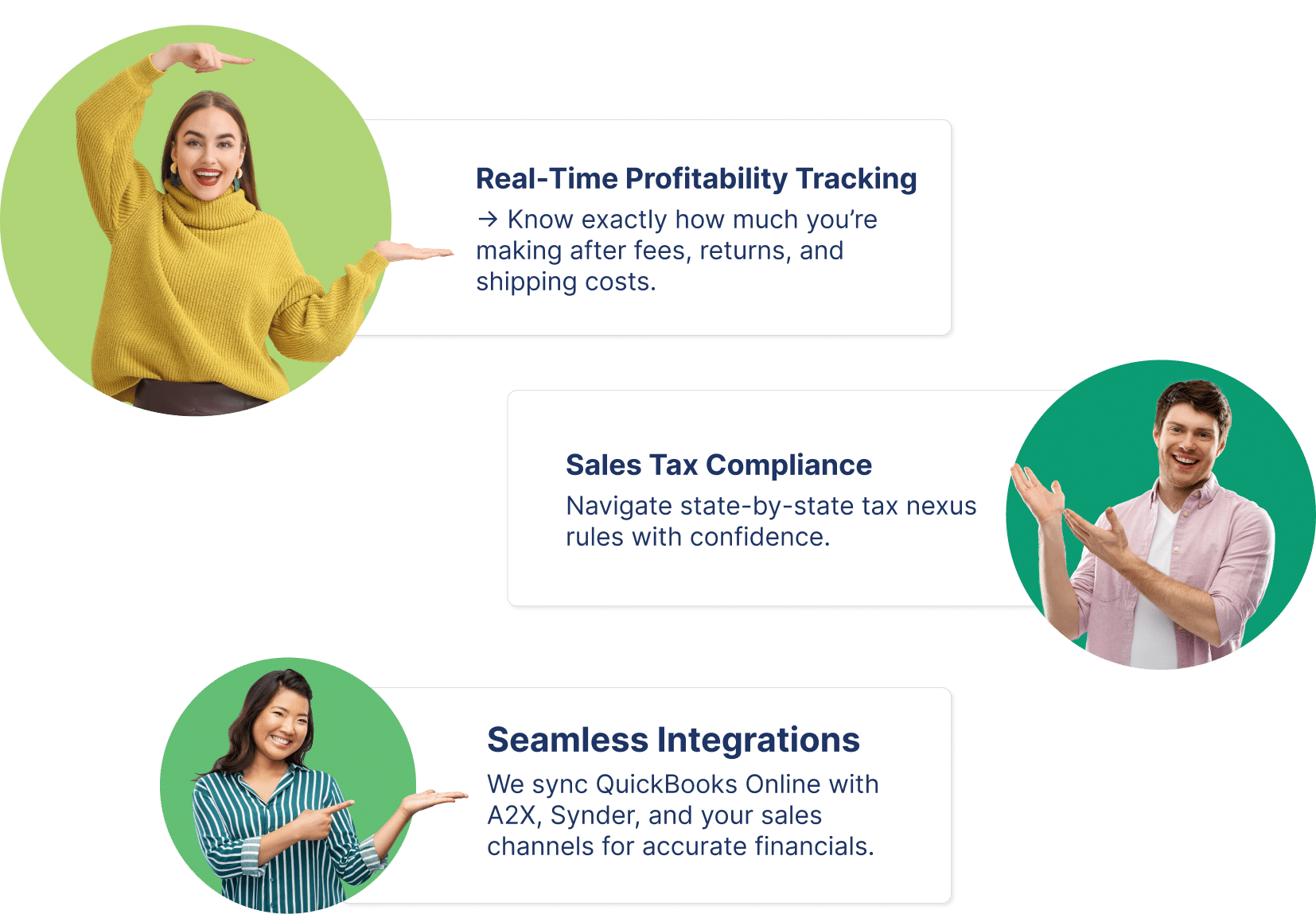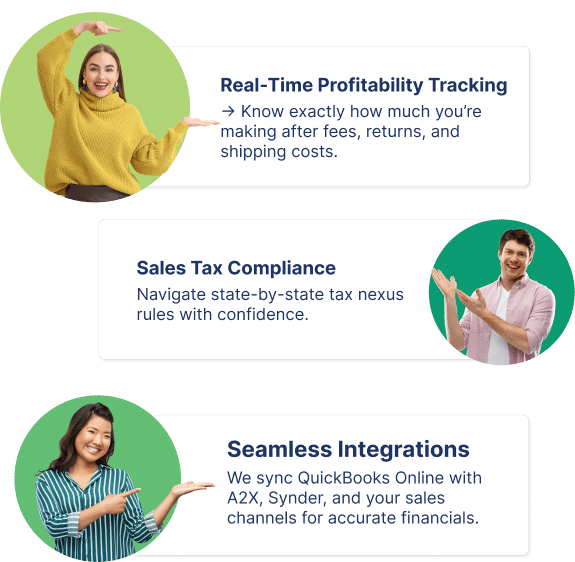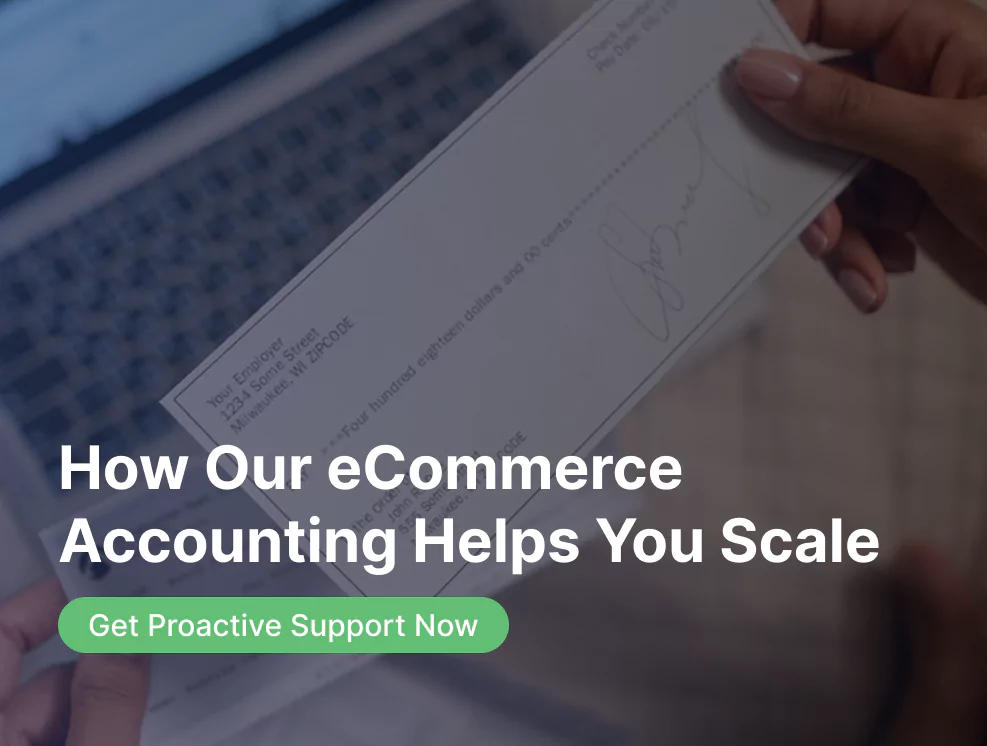Expert eCommerce Accounting & Tax—Built for Online Sellers















Expert eCommerce Accounting & Tax—Built for Online Sellers
"Running a successful eCommerce business requires more than just accurate books—it takes real financial strategy. My team and I provide weekly advisory insights on cash flow, profitability, and inventory planning, so you’re always making data-driven decisions. With real-time financials and proactive tax planning, we help eCommerce businesses
scale with confidence."
scale with confidence."
Heather - Client Advisor Supervisor
"Running a successful eCommerce business requires more than just accurate books—it takes real financial strategy. My team and I provide weekly advisory insights on cash flow, profitability, and inventory planning, so you’re always making data-driven decisions. With real-time financials and proactive tax planning, we help eCommerce businesses scale with confidence."
– Heather, Client Advisor Supervisor
eCommerce Accounting Requires More
Than Just Basic Bookkeeping
Than Just Basic Bookkeeping
Online sellers deal with inventory complexities, marketplace fees, and state-by-state sales tax rules.
Without an accountant who understands eCommerce, you risk overpaying taxes, mismanaging cash flow, or struggling with compliance. That’s where we come in."
Without an accountant who understands eCommerce, you risk overpaying taxes, mismanaging cash flow, or struggling with compliance. That’s where we come in."

It Requires More Than Just
Basic Bookkeeping
Basic Bookkeeping

Without an accountant who understands eCommerce, you risk overpaying taxes, mismanaging cash
flow, or struggling with compliance.
Built for Sellers Like You

Amazon FBA
& FBM Sellers
& FBM Sellers

Shopify
& DTC Brands
& DTC Brands

eBay, Walmart &
Multi-Channel Sellers
Multi-Channel Sellers

Subscription & Digital Product Businesses
Built for Sellers Like You

Amazon FBA &
FBM Sellers

Shopify & DTC Brands

eBay, Walmart &
Multi-Channel Sellers

Subscription & Digital Product Businesses

1. We Get Your Books in Order
QuickBooks Online setup, A2X, Synder, and marketplace
integrations for clean, accurate records.
2. We Manage Your Financials
AI-driven bookkeeping + human oversight to track cash flow,
COGS, and profit margins in real-time.
3. We Provide Tax-Saving Insights
Optimize sales tax compliance, deductions, and year-round
tax strategy to keep more profit.
Frequently Asked Questions (FAQs)
💡
Do you handle sales tax for multi-channel sellers?
Do you handle sales tax for multi-channel sellers?
✅
Absolutely! We help navigate state-by-state tax nexus and ensure compliance.
Absolutely! We help navigate state-by-state tax nexus and ensure compliance.
💡
What accounting software do you recommend?
What accounting software do you recommend?
✅
We use QuickBooks Online paired with A2X and Synder for seamless e-commerce bookkeeping.
We use QuickBooks Online paired with A2X and Synder for seamless e-commerce bookkeeping.
💡
I’m just starting—do I really need an accountant?
I’m just starting—do I really need an accountant?
✅
Yes! Getting the right financial systems in place now saves you major headaches as you scale.
Yes! Getting the right financial systems in place now saves you major headaches as you scale.
Frequently Asked Questions
💡
Do you handle sales tax for multi-channel sellers?
Do you handle sales tax for multi-channel sellers?
✅
Absolutely! We help navigate state-by-state tax nexus and ensure compliance.
Absolutely! We help navigate state-by-state tax nexus and ensure compliance.
💡
What accounting software do you recommend?
What accounting software do you recommend?
✅
We use QuickBooks Online paired with A2X and Synder for seamless e-commerce bookkeeping.
We use QuickBooks Online paired with A2X and Synder for seamless e-commerce bookkeeping.
💡
I’m just starting—do I really need an accountant?
I’m just starting—do I really need an accountant?
✅
Yes! Getting the right financial systems in place now saves you major headaches as you scale.
Yes! Getting the right financial systems in place now saves you major headaches as you scale.
My company and I have been working with Insogna for over a year. They have been a great support to our fast growing business and have worked with me in a number of ways from catching up on back taxes, tax prep, strategy advice, and more - being flexible and adapting to our unique needs. I communicate often with several of the team members, all of which are pleasant to work with and most importantly demonstrate they are experienced at what they do and the way they operate. Definitely recommend.

Insogna CPA has done our Amazon Business taxes for the last two years. They are the best accounting team that we have worked with to date and we plan to be long term clients. Excellent staff who truly care about satisfaction and dilligence. Great for All Amazon Sellers.

Get eCommerce Accounting Support Today
Get eCommerce Accounting Support Today
